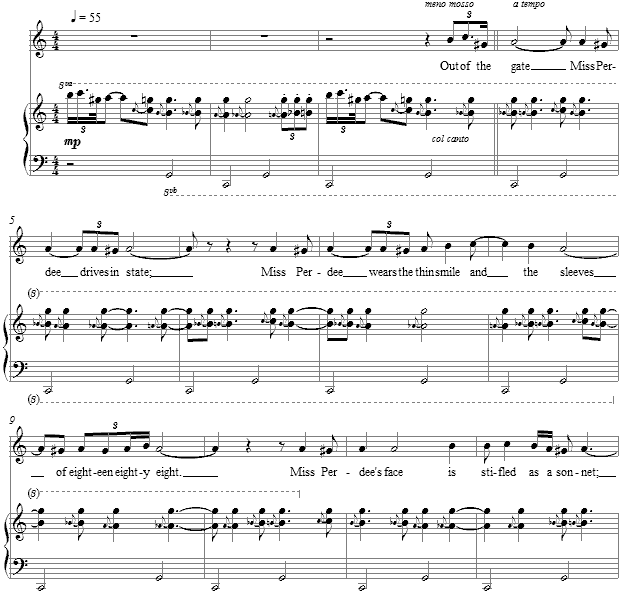Music and Texts of GARY BACHLUND
Vocal Music | Piano | Organ | Chamber Music | Orchestral | Articles and Commentary | Poems and Stories | Miscellany | FAQs
Beyond Debate - (2008)
Hervey Allen
for mezzo soprano and piano
Out from the wrought-iron gate
Miss Perdee drives in state;
Miss Perdee wears the thin smile
And the sleeves of 1888.
Miss Perdee's face is stifled as a sonnet;
Upon her wire-tight hair a duck-shaped bonnet
Nests, nodding with a cachepeigne [ 1 ]
Of violets on it.
East Bay, some tea and talk, them home by King. [ 2 ]
The horses have an antiquated plod;
The team is old, but not too old to balk
If driven north of Broad.
Miss Perdee wears the sure air of a queen,
Which only queens and Perdees can achieve.
The Perdees had blue blood in Adam's veins
When Adam had the rib he gave to Eve.
Back through the wrought-iron gate
Miss Perdee drives in state.
Miss Perdee lives down on the Battery!
Beyond debate.[ 3 pages, circa 3' 15" ]
Hervey Allen
Born in Pittsburgh, Pennsylvania in 1889, author and poet William Hervey Allen graduated from the University of Pittsburgh in 1915, later attended Harvard University for graduate work, and became a Professor of English at the University of Pittsburgh. He also lectured at Columbia University and Vassar College.
Allen is best known for his work Anthony Adverse (1933) which was made into a film by Warner Brothers in 1936; his many novels and poems include Ballads of the Border, which was privately printed (1916), Wampum And Old Gold (1921), The Bride Of Huitzell: An Aztec Legend (1922), Carolina Chansons: Legends Of The Low Country (1922) in which the text above is found, The Blindman: A Ballad Of Nogent L'Artaud (1923), Earth Moods And Other Poems (1925), Christmas Epithlamium (1925), Toward The Flame (1926), Israfel (1926) which is a biography of American writer Edgar Allan Poe, New Legends: Poems (1929), Sarah Simon: Character Atlantean (1929), Songs For Annette (1929), The Book Of Poe: Tales, Criticism, Poems (1934), Toward The Flame: A War Diary (1934), Action At Aquila (1938), Bread Loaf Anthology (1939), It Was Like This: Two Stories Of The Great War (1940), The Forest And The Fort (1943), Bedford Village (1944), Toward The Morning (1948), and The City In The Dawn (1950).
Allen traveled Charleston in order to collaborate with DuBose Heyward on the above mentioned volume of poems, Carolina Chansons, about the contemporary South rather than its nostalgic past. Because Allen developed a strong love for the Everglades, he had a residence at the Glades, in Dade County, where he worked during the last years of his life.
The setting of this cameo portrait of a Charleston social aristocrat imagines a period of time when the horse-drawn carriage had what Allen lovingly calls an "antiquated plod." For this, a non-periodic gesture in the accompaniment equaling a 9/8 span lies irregularly over a plodding tonic-dominant pendulum of 4/4 in the bass. Throughout the setting, these juxtapose oddly yet gently against the vocal line above. The tessitura of the voice is in no way challenging, such that there should be a lethargic character to a performance of this song.
The score for Beyond Debate is available as a free PDF download, though any major commercial performance or recording of the work is prohibited without prior arrangement with the composer. Click on the graphic below for this piano-vocal score.
NOTES
[ 1 ] The "cachepeigne" comes from the French and quite literally means the place for a "hidden comb." It is also any trimming on a hat that fulfils this purpose, but correctly the trimming should be placed beneath the back rim of such a hat. It was a means for securing ladies' hats when worn, especially in windy locales. The Battery area of Charleston certainly often qualifies.
[ 2 ] East Bay is the main thoroughfare bounding bounding the Charleston peninsula down, where the Cooper river meets the ocean forming Charleston's large harbor. King Street is the main shopping street, and Broad Street runs perpendicular to both East Bay and King Street, such that "north of Broad" suggests a different area with businesses in contrast to the upper class homes "south of Broad," especially the large homes facing the bay.
The area south of Broad is the Battery, so-called for the battery and military uses of that part of the city in Revolutionary times. The counterpoint of Miss Perdee, obviously unmarried, as queen references also Queen Street as well as the historical connection of Charleston to the monarchy of England before the Declaration and War of Independence. The blue-blooded Miss Perdee, one might imagine, would have at one time been a loyalist to the British crown and aristocracy by the sarcastic tone of Hervey Allen's word painting.

